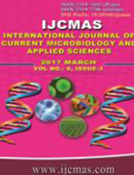


 National Academy of Agricultural Sciences (NAAS)
National Academy of Agricultural Sciences (NAAS)

|
PRINT ISSN : 2319-7692
Online ISSN : 2319-7706 Issues : 12 per year Publisher : Excellent Publishers Email : editorijcmas@gmail.com / submit@ijcmas.com Editor-in-chief: Dr.M.Prakash Index Copernicus ICV 2018: 95.39 NAAS RATING 2020: 5.38 |
Field experiment was conducted on a sandy loam soil during winter irrigated season of 2015-16 at Department of Farm Management, Tamil Nadu Agricultural University, Coimbatore to study the effect of various organic manures and weed control methods on yield attributes and soil enzyme activities of organic cotton cultivation. The experiment was laid out in strip plot design and replicated thrice. Treatments viz., farmyard manure, vermicompost, goat manure and composted poultry manure were assigned to main plot; while hand weeding, twin wheel hoe weeding, power weeding and weedy check were assigned to sub plot and replicated thrice. Weeding operations were done at 20 and 40 DAS. The results of this study showed that organic sources of nutrient and weed management practices, especially composted poultry manure and hand weeding at 20 and 40 DAS enhanced sympodial branches (19.52), fruiting points (54.24), number of bolls (20.65) and boll weight (4.71 g) which was comparable with application of composted poultry manure with power operated weeder weeding on 20 and 40 DAS. Significantly higher enzymes activities viz., phosphatase (39.15 µg of p-nitrophenol released g-1 soil h-1), dehydrogenase (6.47 µg of TPF released g-1 soil h-1) and urease (44.41 µg NH4+ g-1 soil h-1) were found in treatment of composted poultry manure along with hand weeding or power weeding twice on 20 and 40 DAS at harvesting stage. Based on the results, it can be concluded that composted poultry manure along with hand weeding or power weeder weeding in order to enhances soil organic carbon and microbial activity/diversity, which subsequently improve soil enzyme synthesis provide nutrients for crop growth and yield of organic cotton cultivation.
 |
 |
 |
 |
 |